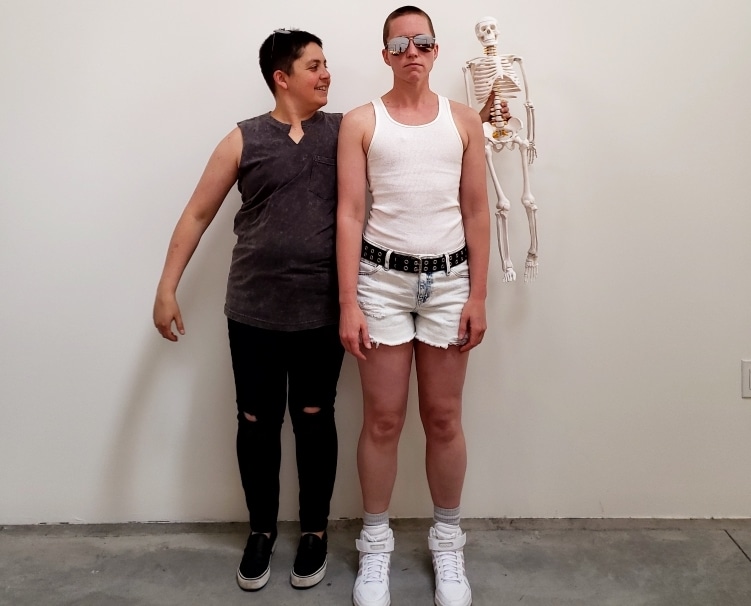//Masha Mikulinsky and Sheila Klein of Amuse-Bouche Productions are performing their new show “#CHAMPION” at this year’s Denver Fringe Festival. Photo courtesy of Amuse-Bouche Productions.
Over the years, LGBTQ+ community members are increasingly elevating conversations about intersectionality during Pride Month. Intersectionality recognizes the multitude of different identities and backgrounds and how they influence how individuals navigate the world, even within the same community. As June winds down, two Denver artists with disabilities are taking the Denver Fringe Festival stage with their new show of queer, disabled survival, “#CHAMPION.”
The festival brings Fringe performance—centering original, innovative and experimental works—to Denver, supporting bold, progressive arts and diverse voices across all genres and performance arts. Sheila Klein and Masha Mikulinsky both use they/them pronouns and together make up Amuse-Bouche Productions, handling choreography/performance and performance/design, respectively, for the production.
“#CHAMPION” has been both five years in the making and was also fully put together within five weeks, Klein said.
“The reality of making work as disabled artists is that even with the most detailed planning, body limitations show up and can really interfere with even the most deliberate devised plans,” they said. “In order for ‘#CHAMPION’ to exist at all, I personally had to be willing to set down hopes of being healthy/strong enough to put up a show I felt confident about, and instead be willing to engage with my body and the creative process as it is.”
Klein said that folks can expect a hilarious, 45-minute, one-person show celebrating the brilliance of Freddie Mercury and Queen along with fabulous dancing. “#CHAMPION” also offers a glimpse into the layers of nuance required to move through the world as a queer, disabled person “and the excessive work required for that to be possible.”
In terms of production, the pair also chose not to hide medical devices, mobility aids, their functions, beeps or unpredictabilities. Instead, these devices act as part of the design, sound score and the overall production aesthetic.
“We were very deliberate in ‘#CHAMPION’ to highlight the limitations and incredibly sophisticated skills our disabilities make possible both on stage and in daily life,” Mikulinsky said. “In some ways, this is very simple: What would happen if we didn’t mask either queerness or disability, without [offering] audience commentary, collapsing dimensionality or framing the work as inspirational.”
Klein added that the conversations “#CHAMPION” tackles are especially relevant in this moment, as trans kids and adults are targeted with oppressive legislation and longstanding abortion rights in the U.S. could be dismantled by the Supreme Court. Klein also mentions the harmful rhetoric surrounding people with disabilities and COVID-19, referencing the CDC director’s public statement, which she’s since apologized for, that it’s “encouraging” 75% of COVID deaths are people with comorbidities.
Amuse-Bouche Productions often explore works that flirt with dimensions of familiarity, discomfort and the funny cracks in our individual and collective strategies to create meaning. “#CHAMPION” fits with this existing body of work—blurring the line between postmodern dance and physical theater, exploring the juxtaposition of a quotidian and hyper-performative repertoire while engaging in social commentary, Klein said.
Though, Klein noted they choreographed this new show in a “completely different body.”
“After 17 hip surgeries, I have had 27 screws and a plate in my pelvis, am unable to lift one leg, have lost 75% of sensation in both legs above the knee, rely on a central line to stay alive, experience blackouts with position changes, and have significant joint instability in my entire body,” they said, adding that they relate differently to what it means to be more visibly, significantly disabled as a performer.
“There are multiple, complex narratives happening simultaneously within ‘#CHAMPION,” Mikulinsky said. “Folks who have engaged with their relationship to queerness and disability are likely to experience the show very differently than folks who haven’t.”
Klein said that “#CHAMPION” is not simply about queerness and disability; the show in itself is queer and disabled. The choreography is purposely filled with exertion and over-efforting that often moves the narrative forward, along with facilitating hard and painful stops in the action.
The main character is “relentless, tender, creative, industrious, hyper-polished and raw,” according to Klein, who says these themes are pervasive in both queer and disabled experiences.
Klein concluded, “We aim to expand audience members’ perceptions of what dance is, challenge their assumptions around what being disabled means, and do so in a way that leaves room for folks to make their own meaning, ask their own questions and feel their own feelings.”
“#CHAMPION” runs June 23 through 26. For more information and to purchase tickets, visit the Denver Fringe website.
Enjoyed this story? Help us keep the lights on! Supporting local press ensures the stories you want to read keep coming, become a member for free today! Click here.





0 Comments